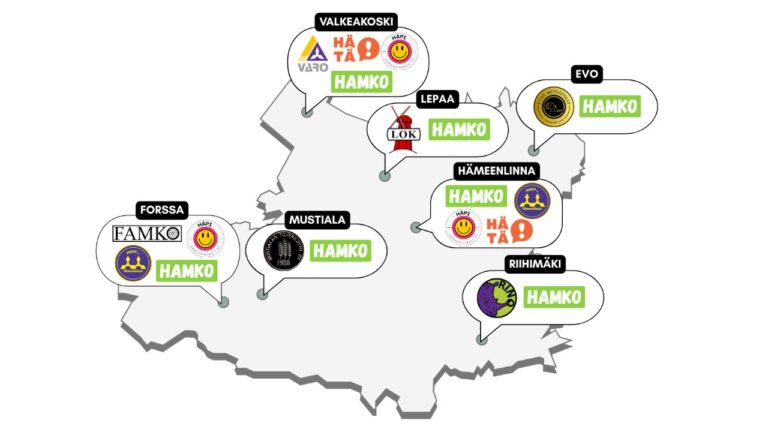Can I Work Part-Time in Finland While Studying?

Many international students dream of studying in Finland and hope to support themselves by working part-time during their studies. The reality, however, is more complex.
Can international students work part-time in Finland while studying? Yes, you are legally allowed to work in Finland while studying. But finding a job is not easy, especially if you don’t speak Finnish.
Finland is not a native English-speaking country, and even basic service jobs often require at least some Finnish language skills, especially outside of Helsinki. There is also strong competition for the limited number of part-time positions, especially in smaller cities.
So, while working part-time is possible, it should not be your main financial plan as a student.
Who Is Allowed to Work in Finland While Studying?
Students from outside the EU or EEA
If you are not a citizen of an EU or EEA country, you can work up to 30 hours per week on average during the academic year.
This rule gives you flexibility. You can work more one week and less the next, as long as your yearly average stays within 30 hours per week. If your degree requires completing a diploma work or internships, the restrictions on working time do not apply to those periods.
Students from EU or EEA countries
If you are from the EU or EEA, you can work without any hourly restrictions. You may decide freely how much you work alongside your studies.
For more information about the regulations regarding working while studying in Finland, please see MIGRI’s website. You can also find more information regarding employment laws and your rights here.
The Reality: Finding a Part-Time Job in Finland Is Challenging
Even though working is allowed, many international students struggle to find a job.
Here’s why:
- Language requirements: Finland is not an English-speaking country. Many jobs — even simple ones in cafes, supermarkets, or cleaning — require at least basic Finnish.
- High competition: Local students, other internationals, and people looking for side income often apply for the same limited positions.
- Few part-time openings: The Finnish labour market is relatively small, and employers tend to hire full-time workers or project-based trainees rather than short-term part-time staff.
- Regulations: in Finland many jobs require certificates such as hygiene passport for restaurant work or occupational safety training.
That means you may spend months searching without success. This can be stressful if you arrive expecting to find work quickly.
How to Find a Part-Time Job as a Student in Finland
Even if it’s challenging, there are ways to improve your chances.
Around 75% of all jobs in Finland are part of the hidden job market — meaning they are never publicly advertised. You find them best through networking.
Here are some practical tips if you wish to work part-time in Finland while studying:
- Join projects at your higher education institute. These often connect you with Finnish companies.
- Participate in intensive courses and exchanges abroad. This will give you more international experience and networking possibilities.
- Take part in career events and student associations. Building professional and peer networks is possible. Asking for conversations with professionals opens more doors than asking for jobs.
- Use Finnish job portals and search for “student jobs” or “English-speaking jobs”. You can also use LinkedIn to find relevant positions, especially during the summertime.
- Engage in hobbies and leisure time activities. Actively engaging in leisure time and hobby activities is important for your wellbeing, and it brings valuable personal networks. Many students find jobs through personal recommendations.
- Learn Finnish. Even a short beginner course can open doors that are otherwise closed. But especially if you wish to stay in Finland after studies, you should study Finnish seriously. Read more about learning Finnish and find self-study materials from our article regarding Finnish language.
Networking and showing motivation are often more important than just sending online applications.
Should You Focus on Work or Studies?
While having a part-time job can be a nice way to gain experience, it’s important to remember what you came to Finland for — your education.
During your studies, you’ll have many valuable opportunities that can build your career more effectively than working part-time:
- Real company projects
- International exchange or short study visits abroad
- Internships connected to your field
- Networking with professionals, teachers and fellow students
Spending too much time on unrelated part-time jobs can take focus away from these opportunities.
Internships, for example, are highly valued in Finland and can lead to real employment after graduation — so give them priority whenever possible. Internships are also a compulsory part of studies at universities of applied sciences. Please, bare in mind that there are both paid and unpaid internships in Finland.
Can I Cover My Tuition Fees and Living Expenses with a Part-Time Job?
Realistically, no.
Part-time jobs can help you earn some extra income, but they will not cover both your tuition fees and living expenses. Tuition fees in Finland vary roughly from €8 000-18 000 and living cost for student is roughly €900-1 200 per month.
Typical student jobs in Finland pay around €9–13 per hour, and all income is taxed.
Even with steady work, the monthly salary usually isn’t enough to pay for tuition fees and living costs at the same time.
If you are an EU or EEA student, you don’t pay tuition fees, so you might manage to cover your basic living expenses with a part-time job but again — finding a job is not guaranteed, and you must arrive in Finland with sufficient savings to support yourself.
Focus on Networking and Internships
If you invest your time wisely, you can gain experience that leads to better opportunities than traditional part-time work.
Use your studies to:
- Build a network with teachers, classmates, and local employers
- Join projects that involve real companies
- Apply for internships in your study field
These experiences are often the real gateway to employment in Finland upon or after graduation. It is good to keep in mind that you are not alone in this process. Great services for international students are available in your educational institute, where you will gain continuous peer and community support.
Working part-time in Finland while studying can be a great learning experience, but it’s not the main reason to study here. Focus on building your skills, networks, and career opportunities — and you’ll be in a much stronger position when you graduate.
In Summary
- Plan your finances before arriving — don’t rely on part-time work as your main income.
- Yes, students can work part-time in Finland but finding a job can be difficult.
- Non-EU/EEA students: up to 30 hours per week.
EU/EEA students: no hourly limits. - Most part-time jobs require Finnish skills, even for simple tasks.
- Salaries (€9–13/hour) won’t cover both tuition and living costs.
- Networking and internships are far more valuable for your future career.



